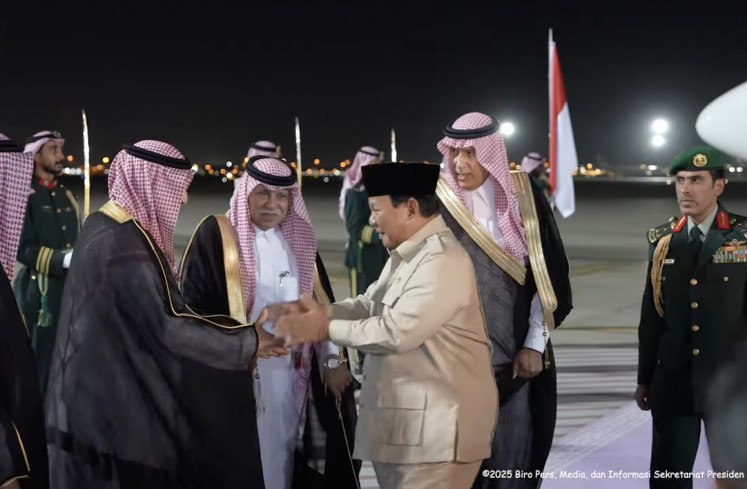Popular Reads
Top Results
Can't find what you're looking for?
View all search resultsPopular Reads
Top Results
Can't find what you're looking for?
View all search resultsIs ASEAN moving toward a community too slowly?
As the 600 million people in Southeast Asia celebrate ASEAN Day today, some scholars question whether the 10-member grouping is traveling on a bullet train or a horse-drawn cart
Change text size
Gift Premium Articles
to Anyone

A
s the 600 million people in Southeast Asia celebrate ASEAN Day today, some scholars question whether the 10-member grouping is traveling on a bullet train or a horse-drawn cart.
The answer to this question is perhaps both.
Yes, ASEAN is on a bullet train in terms of setting ambitious agenda, signing agreements and initiating action plans and new regulations to achieve its goal of creating a single market, a production base and finally an ASEAN Community based on the three pillars of economic cooperation, political and security cooperation and sociocultural cooperation.
In fact, ASEAN leaders meeting in 2007 in Cebu, the Philippines, moved the regional grouping’s main agenda from a slow trajectory to the fast lane by accelerating the establishment of the ASEAN Community to 2015 from the original date of 2020 with the main purpose of quickly “ensuring durable peace, stability and shared prosperity” in the region.
“ASEAN is on the right track and it is moving very fast on many aspects,” ASEAN deputy secretary-general for ASEAN Economic Community Pushpanathan Sundram said.
Several business professionals, scholars, regional experts and officials agreed recently during the fourth ASEAN and Asian Forum (AAF) meeting in Singapore last week that ASEAN had been making progressive strides in recent years. They were also optimistic about ASEAN as an engine for growing economic integration.
“I am optimistic on prospects in ASEAN. The recent macroeconomic policies [in several ASEAN member states] are some of the smartest in the world,” Charles Ormiston, the chairman of Bain & Company Southeast Asia, said in his remarks at the AAF.
It is clear from the booming economies of ASEAN member states that ASEAN economies (see table) outperformed global peers in 2010 and will continue to do so this year and in 2012.
“ASEAN recorded impressive economic growth of 7.4 percent in 2010 against a world average of 5 percent. ASEAN is also expected to grow 5.5 percent this year and 5.7 percent in 2012,” Pushpanathan said at the AAF.
In trade and foreign direct investments, ASEAN economies made a big leap despite the global financial crisis.
“The total trade of ASEAN countries surged to US$2.09 trillion in 2010, a huge jump from $1.54 trillion in 2009,” Pushpanathan said.
In 2010, he said, ASEAN received a record $75.08 billion in FDI, also a big leap from $37.9 billion in 2009.
But on the implementation side, ASEAN was moving on a cart. After the initial enthusiasm and spirit in 2007, everybody — including ASEAN officials — is pessimistic about creating an ASEAN Community by 2015.
“I don’t think we can create it by 2015. But it’s not end of the story. It will take some time,” an ASEAN envoy speaking on condition of anonymity, said recently in Jakarta.
Businesspeople see the problem differently.
“The challenge in ASEAN is political will,” Air Asia X chief executive officer Azran Osman-Rani said.
The ASEAN Secretariat is not an implementing body. The implementation of ASEAN programs lies in the hands of member states, which are either slow or feel the programs clash with their national interests.
Echoing Azran’s view, Indonesian political scientist Rizal Sukma raises the question: Where is ASEAN now?
“ASEAN is in the middle of traffic jam. We can’t achieve an ASEAN Community and other goals by 2015,” Rizal, the executive director of the Centre for Strategic and International Studies, said.
It a time, he said, to think about a graceful exit.
“The best way is to revise the ASEAN Charter and impose stricter rules and a sanction mechanism for implementation of ASEAN programs,” Rizal said.
The ASEAN Secretariat, he added, should also be given more power and money to meet the challenges.









